Ethical Value of Integrity: Leadership and Management
VerifiedAdded on 2023/05/31
|7
|1505
|322
Essay
AI Summary
This essay delves into the ethical value of integrity, examining its significance in the workplace and its impact on leadership and management. The essay defines integrity as the soundness of moral principles and character, highlighting its importance in ethical decision-making and organizational behavior. It explores how integrity impacts the workplace, including building ethical behaviors and adhering to professional codes. The essay identifies challenges to integrity, such as organizational culture and lack of incentives, and proposes solutions like developing a culture of integrity, creating organizational policies, and using incentives. It also discusses why understanding integrity is crucial for managers and leaders, emphasizing the need for leading by example, addressing organizational issues, and setting clear expectations. The essay concludes by applying consequentialist and virtue ethics theories to illustrate the importance of integrity in ethical decision-making and employee selection.
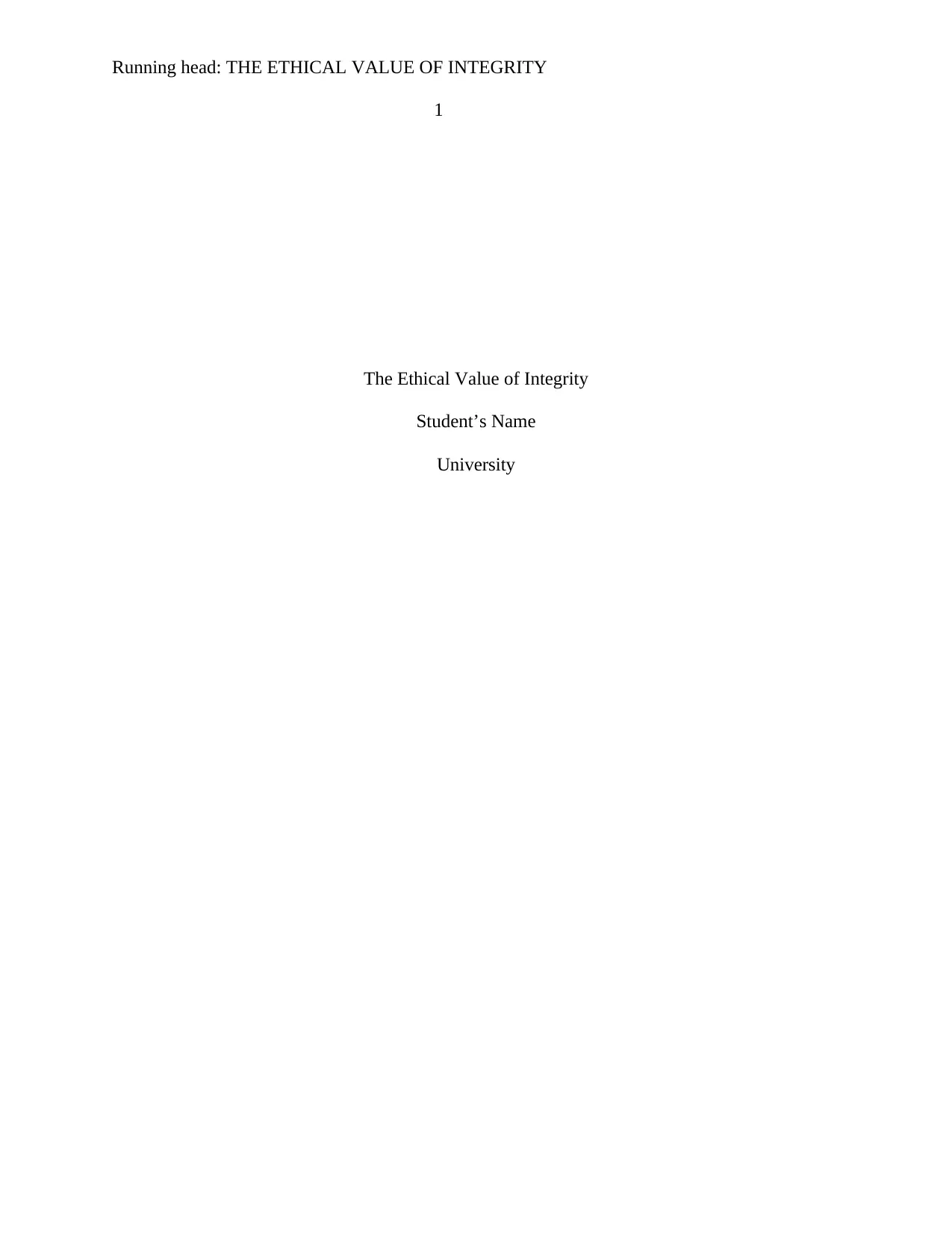
Running head: THE ETHICAL VALUE OF INTEGRITY
1
The Ethical Value of Integrity
Student’s Name
University
1
The Ethical Value of Integrity
Student’s Name
University
Paraphrase This Document
Need a fresh take? Get an instant paraphrase of this document with our AI Paraphraser
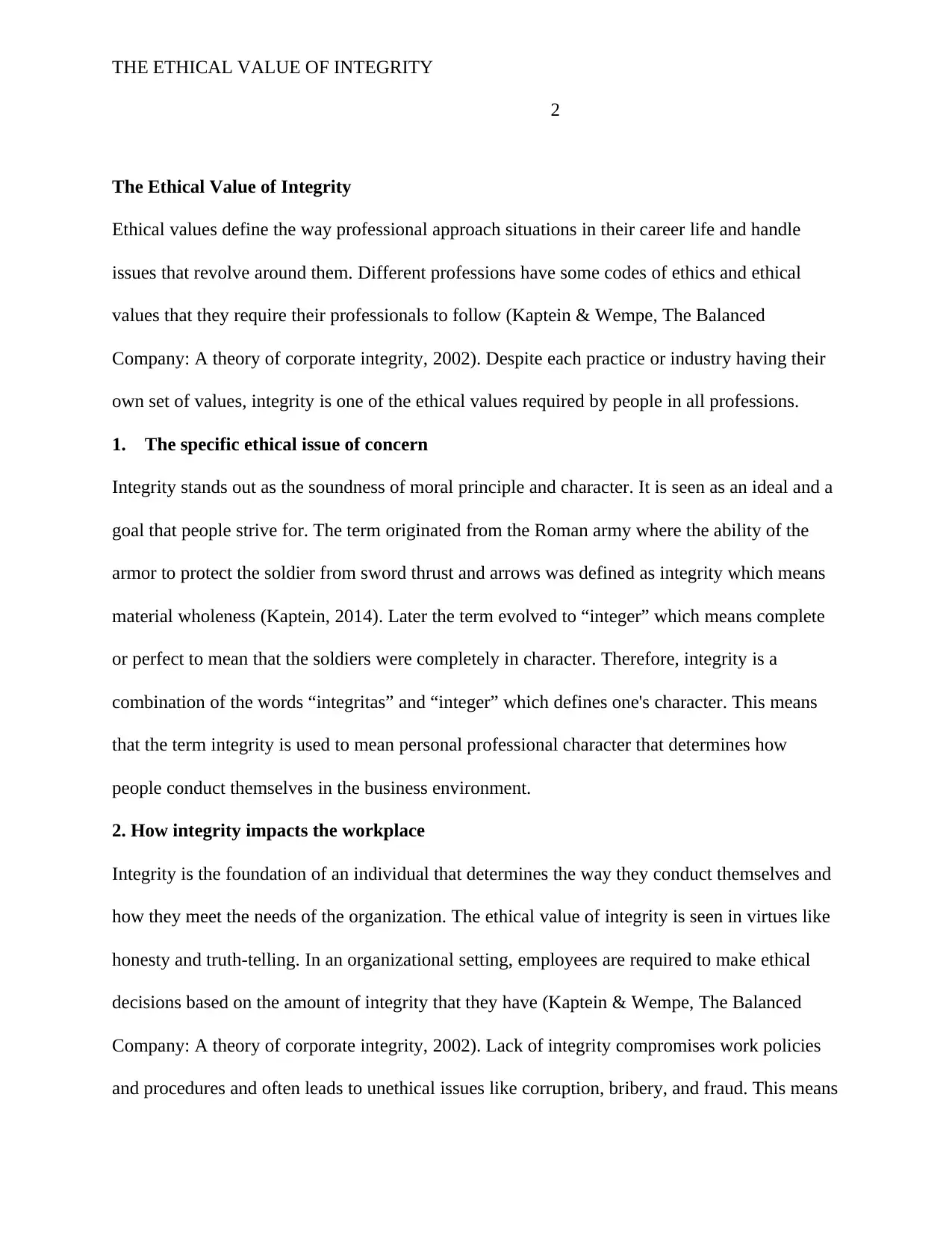
THE ETHICAL VALUE OF INTEGRITY
2
The Ethical Value of Integrity
Ethical values define the way professional approach situations in their career life and handle
issues that revolve around them. Different professions have some codes of ethics and ethical
values that they require their professionals to follow (Kaptein & Wempe, The Balanced
Company: A theory of corporate integrity, 2002). Despite each practice or industry having their
own set of values, integrity is one of the ethical values required by people in all professions.
1. The specific ethical issue of concern
Integrity stands out as the soundness of moral principle and character. It is seen as an ideal and a
goal that people strive for. The term originated from the Roman army where the ability of the
armor to protect the soldier from sword thrust and arrows was defined as integrity which means
material wholeness (Kaptein, 2014). Later the term evolved to “integer” which means complete
or perfect to mean that the soldiers were completely in character. Therefore, integrity is a
combination of the words “integritas” and “integer” which defines one's character. This means
that the term integrity is used to mean personal professional character that determines how
people conduct themselves in the business environment.
2. How integrity impacts the workplace
Integrity is the foundation of an individual that determines the way they conduct themselves and
how they meet the needs of the organization. The ethical value of integrity is seen in virtues like
honesty and truth-telling. In an organizational setting, employees are required to make ethical
decisions based on the amount of integrity that they have (Kaptein & Wempe, The Balanced
Company: A theory of corporate integrity, 2002). Lack of integrity compromises work policies
and procedures and often leads to unethical issues like corruption, bribery, and fraud. This means
2
The Ethical Value of Integrity
Ethical values define the way professional approach situations in their career life and handle
issues that revolve around them. Different professions have some codes of ethics and ethical
values that they require their professionals to follow (Kaptein & Wempe, The Balanced
Company: A theory of corporate integrity, 2002). Despite each practice or industry having their
own set of values, integrity is one of the ethical values required by people in all professions.
1. The specific ethical issue of concern
Integrity stands out as the soundness of moral principle and character. It is seen as an ideal and a
goal that people strive for. The term originated from the Roman army where the ability of the
armor to protect the soldier from sword thrust and arrows was defined as integrity which means
material wholeness (Kaptein, 2014). Later the term evolved to “integer” which means complete
or perfect to mean that the soldiers were completely in character. Therefore, integrity is a
combination of the words “integritas” and “integer” which defines one's character. This means
that the term integrity is used to mean personal professional character that determines how
people conduct themselves in the business environment.
2. How integrity impacts the workplace
Integrity is the foundation of an individual that determines the way they conduct themselves and
how they meet the needs of the organization. The ethical value of integrity is seen in virtues like
honesty and truth-telling. In an organizational setting, employees are required to make ethical
decisions based on the amount of integrity that they have (Kaptein & Wempe, The Balanced
Company: A theory of corporate integrity, 2002). Lack of integrity compromises work policies
and procedures and often leads to unethical issues like corruption, bribery, and fraud. This means
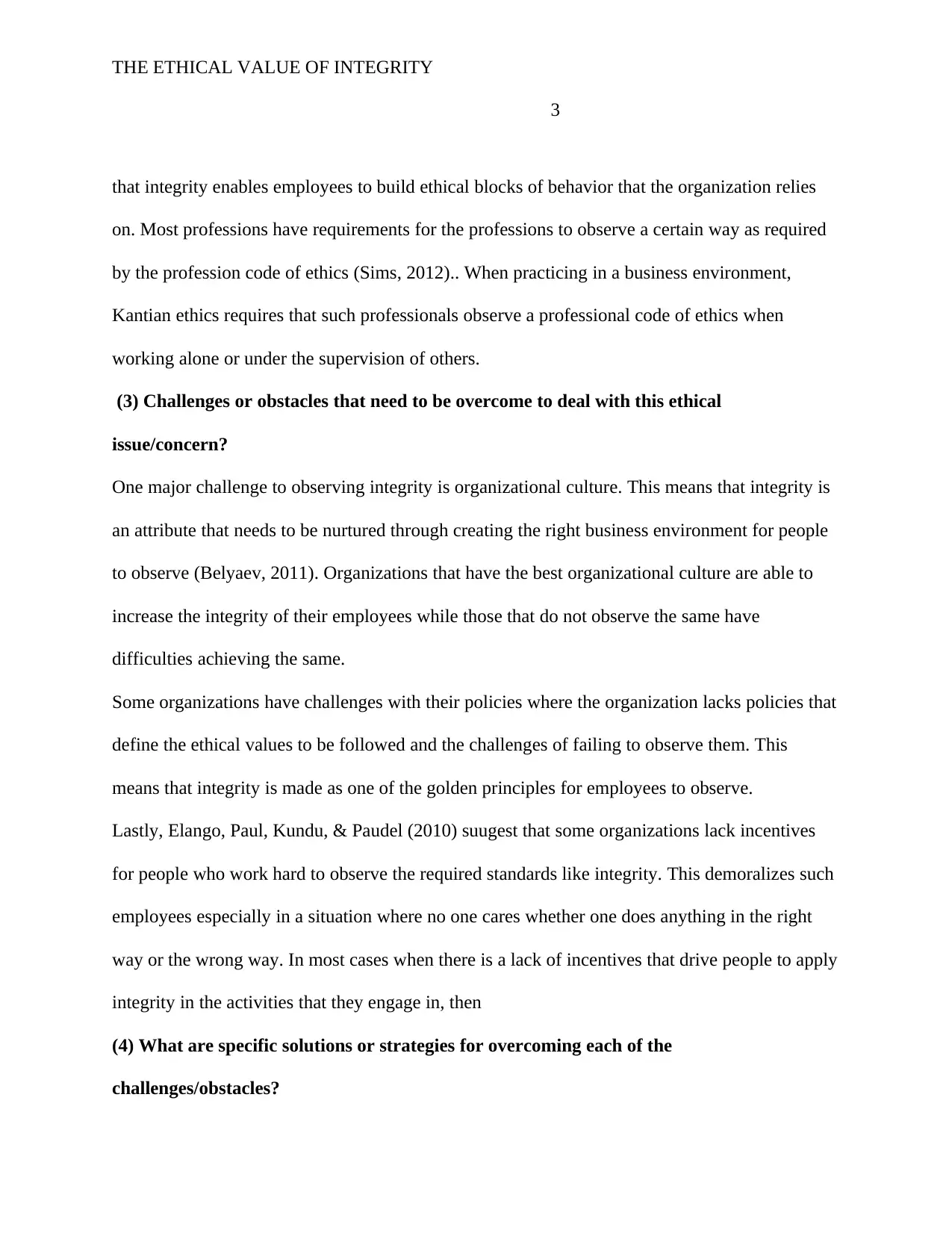
THE ETHICAL VALUE OF INTEGRITY
3
that integrity enables employees to build ethical blocks of behavior that the organization relies
on. Most professions have requirements for the professions to observe a certain way as required
by the profession code of ethics (Sims, 2012).. When practicing in a business environment,
Kantian ethics requires that such professionals observe a professional code of ethics when
working alone or under the supervision of others.
(3) Challenges or obstacles that need to be overcome to deal with this ethical
issue/concern?
One major challenge to observing integrity is organizational culture. This means that integrity is
an attribute that needs to be nurtured through creating the right business environment for people
to observe (Belyaev, 2011). Organizations that have the best organizational culture are able to
increase the integrity of their employees while those that do not observe the same have
difficulties achieving the same.
Some organizations have challenges with their policies where the organization lacks policies that
define the ethical values to be followed and the challenges of failing to observe them. This
means that integrity is made as one of the golden principles for employees to observe.
Lastly, Elango, Paul, Kundu, & Paudel (2010) suugest that some organizations lack incentives
for people who work hard to observe the required standards like integrity. This demoralizes such
employees especially in a situation where no one cares whether one does anything in the right
way or the wrong way. In most cases when there is a lack of incentives that drive people to apply
integrity in the activities that they engage in, then
(4) What are specific solutions or strategies for overcoming each of the
challenges/obstacles?
3
that integrity enables employees to build ethical blocks of behavior that the organization relies
on. Most professions have requirements for the professions to observe a certain way as required
by the profession code of ethics (Sims, 2012).. When practicing in a business environment,
Kantian ethics requires that such professionals observe a professional code of ethics when
working alone or under the supervision of others.
(3) Challenges or obstacles that need to be overcome to deal with this ethical
issue/concern?
One major challenge to observing integrity is organizational culture. This means that integrity is
an attribute that needs to be nurtured through creating the right business environment for people
to observe (Belyaev, 2011). Organizations that have the best organizational culture are able to
increase the integrity of their employees while those that do not observe the same have
difficulties achieving the same.
Some organizations have challenges with their policies where the organization lacks policies that
define the ethical values to be followed and the challenges of failing to observe them. This
means that integrity is made as one of the golden principles for employees to observe.
Lastly, Elango, Paul, Kundu, & Paudel (2010) suugest that some organizations lack incentives
for people who work hard to observe the required standards like integrity. This demoralizes such
employees especially in a situation where no one cares whether one does anything in the right
way or the wrong way. In most cases when there is a lack of incentives that drive people to apply
integrity in the activities that they engage in, then
(4) What are specific solutions or strategies for overcoming each of the
challenges/obstacles?
⊘ This is a preview!⊘
Do you want full access?
Subscribe today to unlock all pages.

Trusted by 1+ million students worldwide
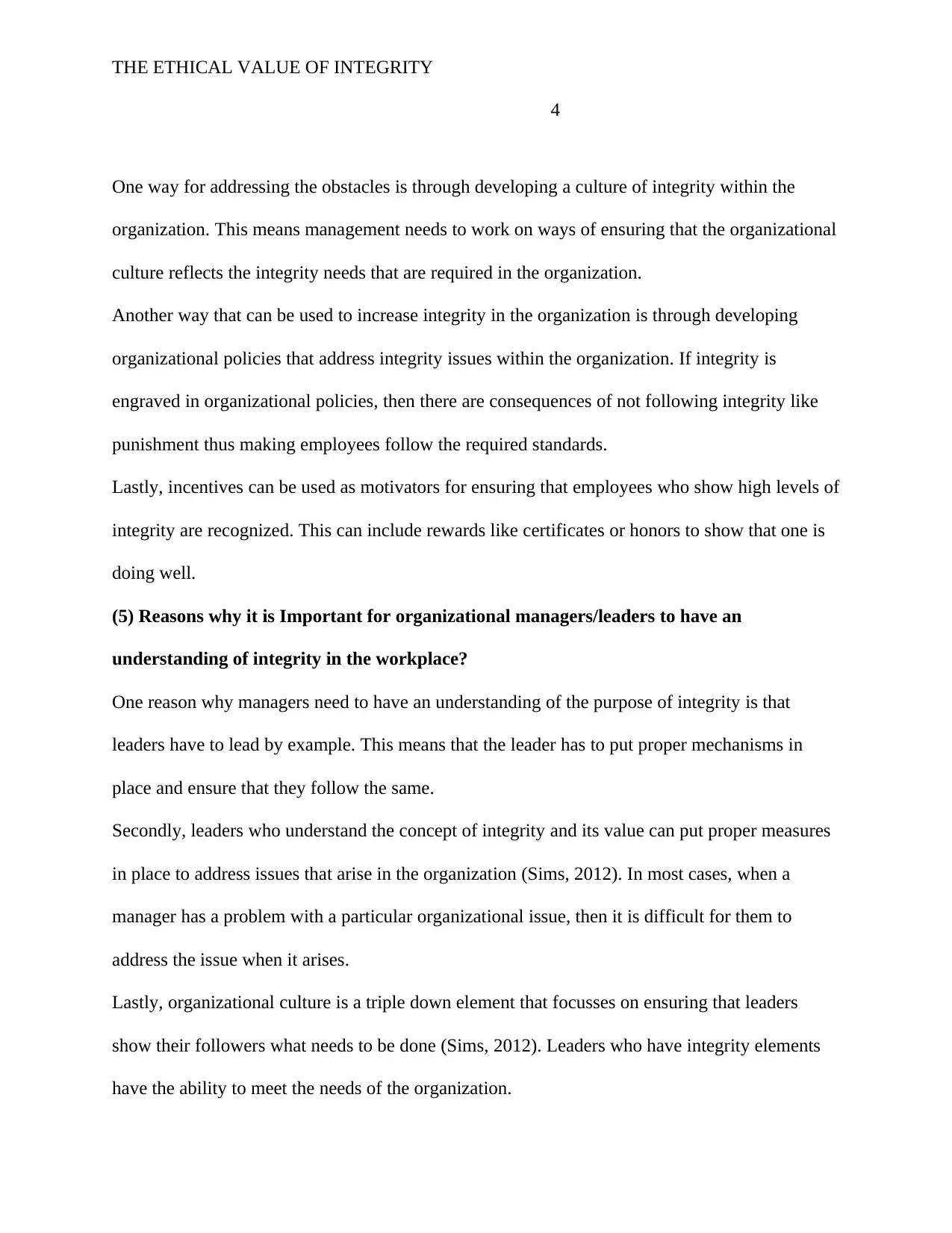
THE ETHICAL VALUE OF INTEGRITY
4
One way for addressing the obstacles is through developing a culture of integrity within the
organization. This means management needs to work on ways of ensuring that the organizational
culture reflects the integrity needs that are required in the organization.
Another way that can be used to increase integrity in the organization is through developing
organizational policies that address integrity issues within the organization. If integrity is
engraved in organizational policies, then there are consequences of not following integrity like
punishment thus making employees follow the required standards.
Lastly, incentives can be used as motivators for ensuring that employees who show high levels of
integrity are recognized. This can include rewards like certificates or honors to show that one is
doing well.
(5) Reasons why it is Important for organizational managers/leaders to have an
understanding of integrity in the workplace?
One reason why managers need to have an understanding of the purpose of integrity is that
leaders have to lead by example. This means that the leader has to put proper mechanisms in
place and ensure that they follow the same.
Secondly, leaders who understand the concept of integrity and its value can put proper measures
in place to address issues that arise in the organization (Sims, 2012). In most cases, when a
manager has a problem with a particular organizational issue, then it is difficult for them to
address the issue when it arises.
Lastly, organizational culture is a triple down element that focusses on ensuring that leaders
show their followers what needs to be done (Sims, 2012). Leaders who have integrity elements
have the ability to meet the needs of the organization.
4
One way for addressing the obstacles is through developing a culture of integrity within the
organization. This means management needs to work on ways of ensuring that the organizational
culture reflects the integrity needs that are required in the organization.
Another way that can be used to increase integrity in the organization is through developing
organizational policies that address integrity issues within the organization. If integrity is
engraved in organizational policies, then there are consequences of not following integrity like
punishment thus making employees follow the required standards.
Lastly, incentives can be used as motivators for ensuring that employees who show high levels of
integrity are recognized. This can include rewards like certificates or honors to show that one is
doing well.
(5) Reasons why it is Important for organizational managers/leaders to have an
understanding of integrity in the workplace?
One reason why managers need to have an understanding of the purpose of integrity is that
leaders have to lead by example. This means that the leader has to put proper mechanisms in
place and ensure that they follow the same.
Secondly, leaders who understand the concept of integrity and its value can put proper measures
in place to address issues that arise in the organization (Sims, 2012). In most cases, when a
manager has a problem with a particular organizational issue, then it is difficult for them to
address the issue when it arises.
Lastly, organizational culture is a triple down element that focusses on ensuring that leaders
show their followers what needs to be done (Sims, 2012). Leaders who have integrity elements
have the ability to meet the needs of the organization.
Paraphrase This Document
Need a fresh take? Get an instant paraphrase of this document with our AI Paraphraser
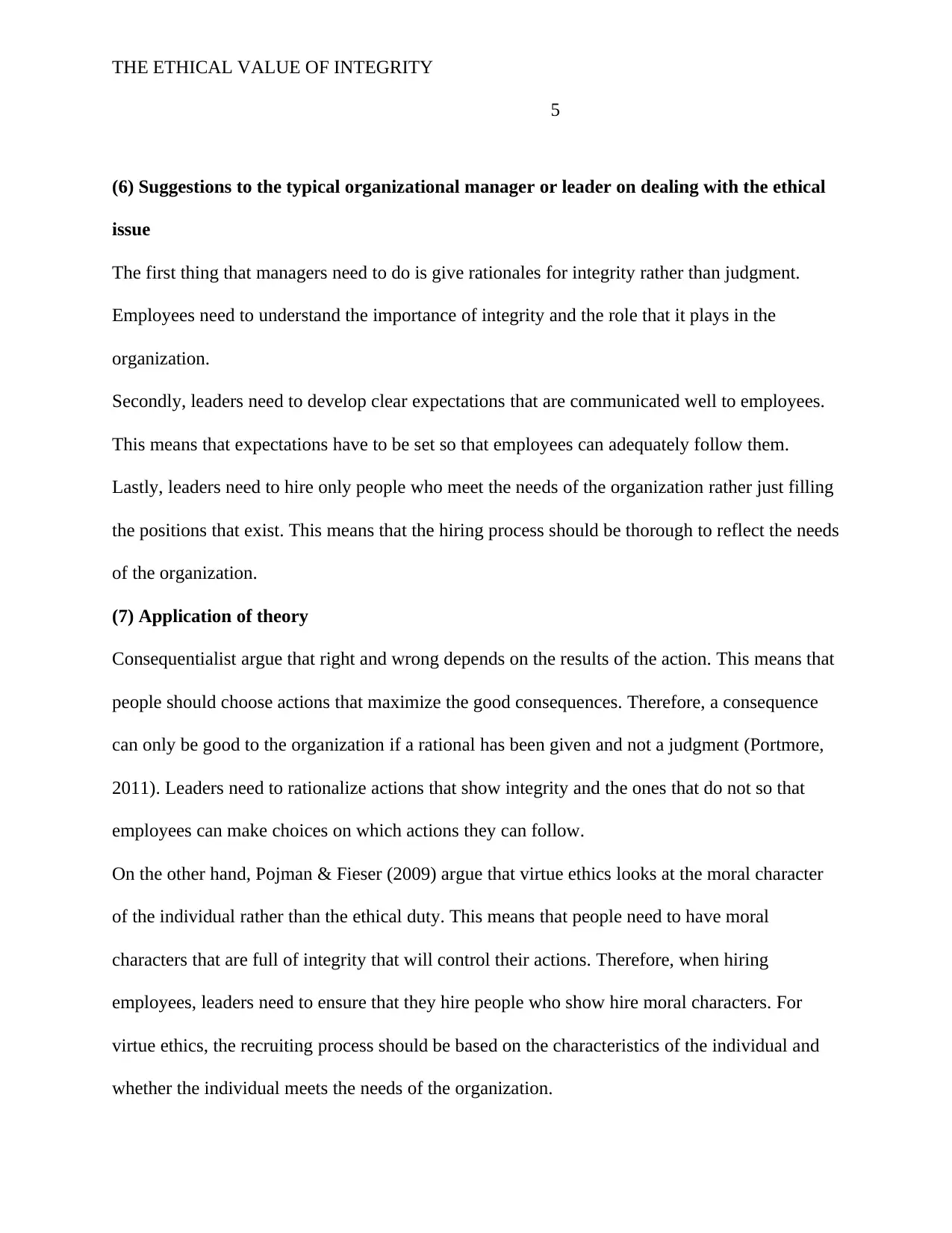
THE ETHICAL VALUE OF INTEGRITY
5
(6) Suggestions to the typical organizational manager or leader on dealing with the ethical
issue
The first thing that managers need to do is give rationales for integrity rather than judgment.
Employees need to understand the importance of integrity and the role that it plays in the
organization.
Secondly, leaders need to develop clear expectations that are communicated well to employees.
This means that expectations have to be set so that employees can adequately follow them.
Lastly, leaders need to hire only people who meet the needs of the organization rather just filling
the positions that exist. This means that the hiring process should be thorough to reflect the needs
of the organization.
(7) Application of theory
Consequentialist argue that right and wrong depends on the results of the action. This means that
people should choose actions that maximize the good consequences. Therefore, a consequence
can only be good to the organization if a rational has been given and not a judgment (Portmore,
2011). Leaders need to rationalize actions that show integrity and the ones that do not so that
employees can make choices on which actions they can follow.
On the other hand, Pojman & Fieser (2009) argue that virtue ethics looks at the moral character
of the individual rather than the ethical duty. This means that people need to have moral
characters that are full of integrity that will control their actions. Therefore, when hiring
employees, leaders need to ensure that they hire people who show hire moral characters. For
virtue ethics, the recruiting process should be based on the characteristics of the individual and
whether the individual meets the needs of the organization.
5
(6) Suggestions to the typical organizational manager or leader on dealing with the ethical
issue
The first thing that managers need to do is give rationales for integrity rather than judgment.
Employees need to understand the importance of integrity and the role that it plays in the
organization.
Secondly, leaders need to develop clear expectations that are communicated well to employees.
This means that expectations have to be set so that employees can adequately follow them.
Lastly, leaders need to hire only people who meet the needs of the organization rather just filling
the positions that exist. This means that the hiring process should be thorough to reflect the needs
of the organization.
(7) Application of theory
Consequentialist argue that right and wrong depends on the results of the action. This means that
people should choose actions that maximize the good consequences. Therefore, a consequence
can only be good to the organization if a rational has been given and not a judgment (Portmore,
2011). Leaders need to rationalize actions that show integrity and the ones that do not so that
employees can make choices on which actions they can follow.
On the other hand, Pojman & Fieser (2009) argue that virtue ethics looks at the moral character
of the individual rather than the ethical duty. This means that people need to have moral
characters that are full of integrity that will control their actions. Therefore, when hiring
employees, leaders need to ensure that they hire people who show hire moral characters. For
virtue ethics, the recruiting process should be based on the characteristics of the individual and
whether the individual meets the needs of the organization.
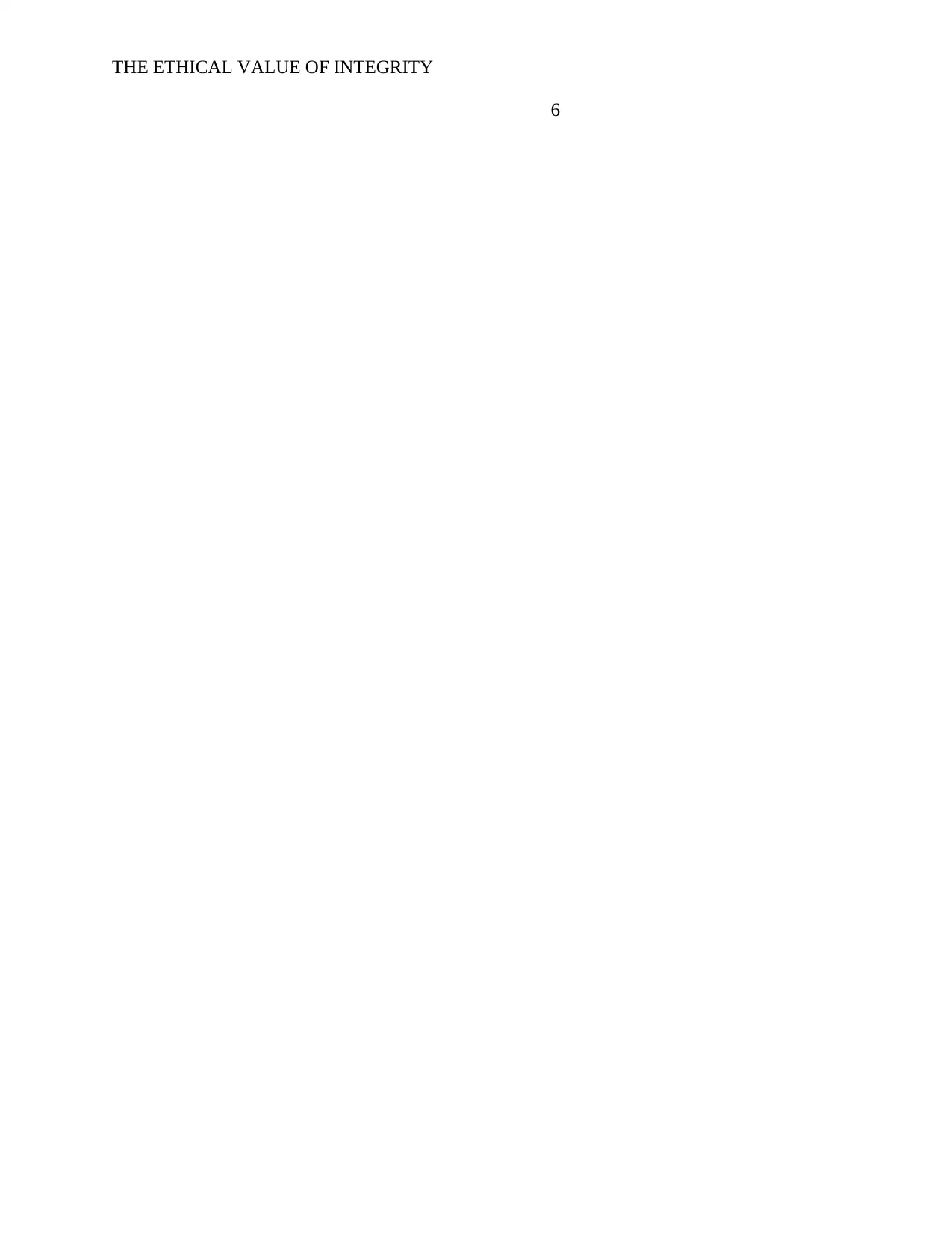
THE ETHICAL VALUE OF INTEGRITY
6
6
⊘ This is a preview!⊘
Do you want full access?
Subscribe today to unlock all pages.

Trusted by 1+ million students worldwide
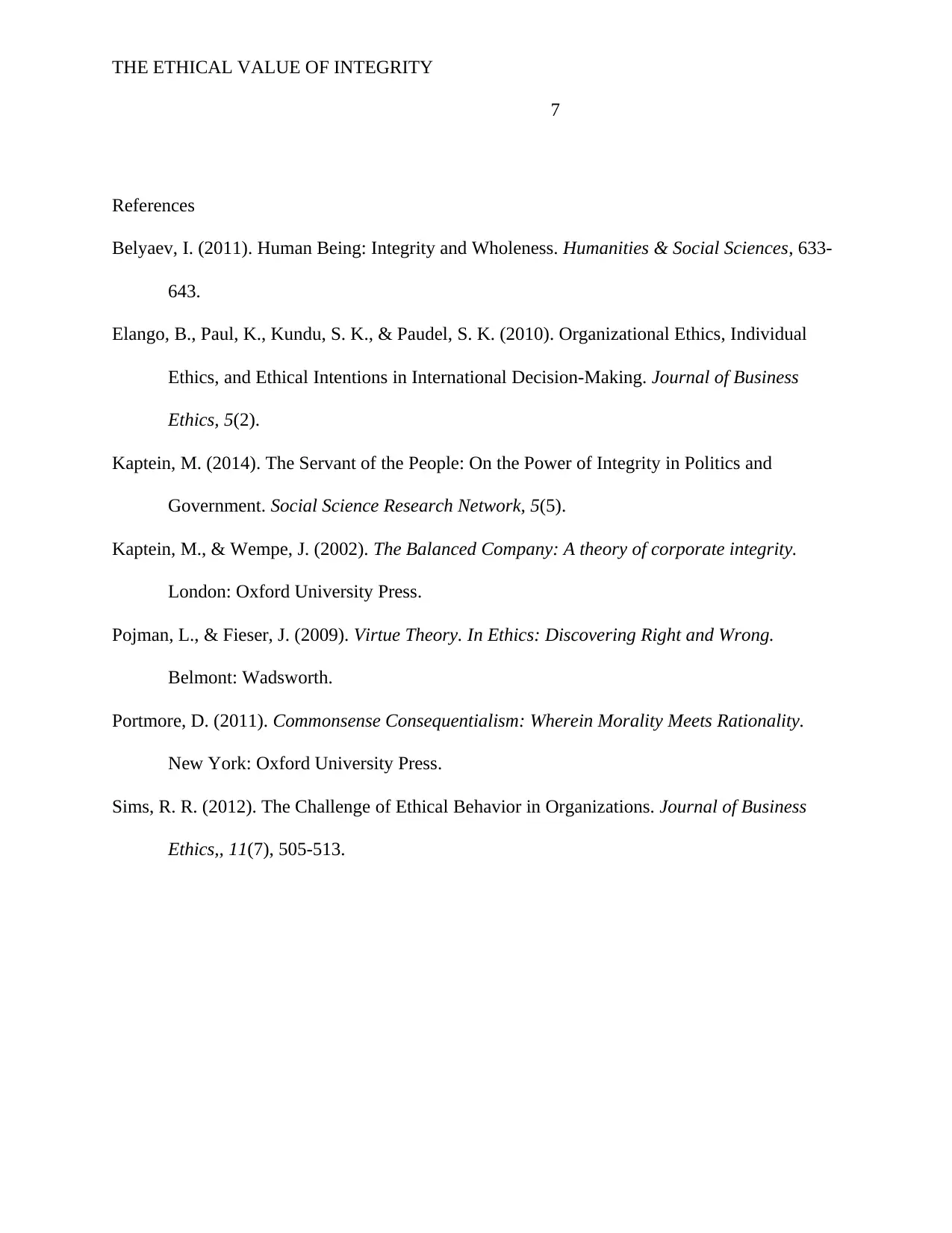
THE ETHICAL VALUE OF INTEGRITY
7
References
Belyaev, I. (2011). Human Being: Integrity and Wholeness. Humanities & Social Sciences, 633-
643.
Elango, B., Paul, K., Kundu, S. K., & Paudel, S. K. (2010). Organizational Ethics, Individual
Ethics, and Ethical Intentions in International Decision-Making. Journal of Business
Ethics, 5(2).
Kaptein, M. (2014). The Servant of the People: On the Power of Integrity in Politics and
Government. Social Science Research Network, 5(5).
Kaptein, M., & Wempe, J. (2002). The Balanced Company: A theory of corporate integrity.
London: Oxford University Press.
Pojman, L., & Fieser, J. (2009). Virtue Theory. In Ethics: Discovering Right and Wrong.
Belmont: Wadsworth.
Portmore, D. (2011). Commonsense Consequentialism: Wherein Morality Meets Rationality.
New York: Oxford University Press.
Sims, R. R. (2012). The Challenge of Ethical Behavior in Organizations. Journal of Business
Ethics,, 11(7), 505-513.
7
References
Belyaev, I. (2011). Human Being: Integrity and Wholeness. Humanities & Social Sciences, 633-
643.
Elango, B., Paul, K., Kundu, S. K., & Paudel, S. K. (2010). Organizational Ethics, Individual
Ethics, and Ethical Intentions in International Decision-Making. Journal of Business
Ethics, 5(2).
Kaptein, M. (2014). The Servant of the People: On the Power of Integrity in Politics and
Government. Social Science Research Network, 5(5).
Kaptein, M., & Wempe, J. (2002). The Balanced Company: A theory of corporate integrity.
London: Oxford University Press.
Pojman, L., & Fieser, J. (2009). Virtue Theory. In Ethics: Discovering Right and Wrong.
Belmont: Wadsworth.
Portmore, D. (2011). Commonsense Consequentialism: Wherein Morality Meets Rationality.
New York: Oxford University Press.
Sims, R. R. (2012). The Challenge of Ethical Behavior in Organizations. Journal of Business
Ethics,, 11(7), 505-513.
1 out of 7
Related Documents
Your All-in-One AI-Powered Toolkit for Academic Success.
+13062052269
info@desklib.com
Available 24*7 on WhatsApp / Email
![[object Object]](/_next/static/media/star-bottom.7253800d.svg)
Unlock your academic potential
Copyright © 2020–2026 A2Z Services. All Rights Reserved. Developed and managed by ZUCOL.





